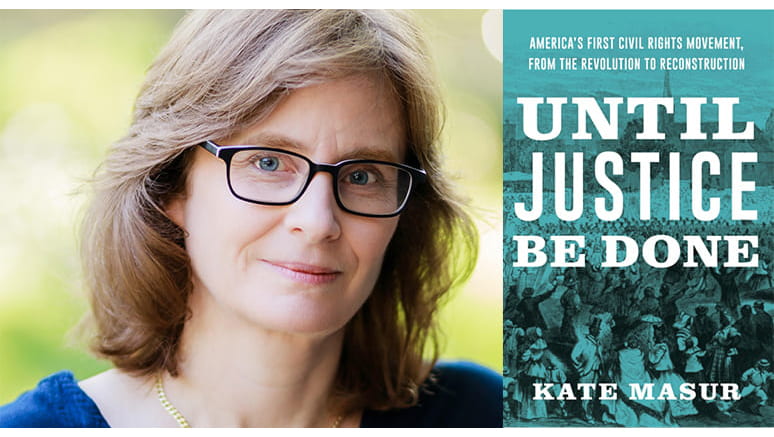The New York Times names Professor Kate Masur’s book, “Until Justice Be Done,” one of the best books of 2021
December 16, 2021

The New York Times has named Professor Kate Masur’s book, Until Justice Be Done: America’s First Civil Rights Movement, from the Revolution to Reconstruction (W. W. Norton, 2021), one of the best books of 2021. The work examines the restrictive codes called Black laws or Black codes that constrained the lives of Black people in northern free states, where slavery was banned.
Recently, Masur spoke about the book with Steve Inskeep on NPR’s Morning Edition, where she discussed the fight against the Midwestern Black laws and the connections to mobilizations for racial justice today.
Learn more about Kate Masur:
Kate Masur (Ph.D. University of Michigan, 2001) specializes in the history of race, politics, and law in the nineteenth-century United States. She is the author of Until Justice Be Done: America’s First Civil Rights Movement, from the Revolution to Reconstruction (W. W. Norton, 2021) and numerous other books and articles including An Example for All the Land: Emancipation and the Struggle over Equality in Washington, D.C. (UNC Press, 2010), and, with Gregory Downs, The World the Civil War Made (UNC Press, 2015).
Masur has consulted extensively with museums and arts organizations including the National Constitution Center and the Newberry Library. She was part of the editorial team that created Reconstruction: The Official National Park Service Handbook, and she co-authored, with Gregory Downs, The Era of Reconstruction, 1861-1900, a National Historic Landmark Theme Study published in 2017. She was also a key consultant for the 2019 documentary, Reconstruction: America after the Civil War and appeared in the recent CNN film, Lincoln: Divided We Stand.
Masur regularly works with K-12 teachers and speaks with the media on topics including the Civil War and Reconstruction, Lincoln, and monuments and public memory. She and Downs are co-editors of the Journal of the Civil War Era, published by University of North Carolina Press.
Masur’s scholarship has recently appeared in The Journal of the Civil War Era and the American Journal of Legal History, in volumes on the Memphis Massacre and biographical film in history, and as commentary in the Chicago Tribune, the New York Times, and the Washington Post’s Made By History.
Related:
Arts & Humanities

Weinberg College faculty and graduate students recognized for excellence in teaching
July 2, 2025
Each year, the Weinberg College of Arts and Sciences and the Office of the Provost recognizes members of the College’s tenure-line and teaching-track faculty for excellence in teaching. Weinberg College in addition recognizes the contributions…

Passion for the planet: A new generation of environmental stewards starts here
May 29, 2025
Over the last two decades, the Weinberg College-housed Program in Environmental Policy and Culture (EPC) at Northwestern has embraced the humanities and social sciences and cultivated a new generation of environmental stewards. Growing up in…

MFA graduate bree gant on how several mediums shape her artistic practice
May 14, 2025
bree gant is in her studio in Locy Hall writing. Her words flow horizontally across the page, wrapping left to right down the page. Like movements in a dance sequence, the word order changes slightly…

2025 Convocation speaker Junta Nakai ’04 shows how grit and determination fueled his success in the tech world
April 14, 2025
Junta Nakai knows exactly how he got here. Here, is his position as the global vice president at Databricks, a San Francisco-based data analytics and artificial intelligence (AI) company. The globe’s sixth-largest startup, Databricks, was…



